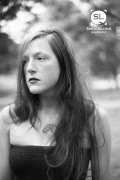Based on your website, I get the impression that you’re an all-around prose writer: essays, articles, short stories, a novel, you name it. What motivates you to work in flash fiction? How do you decide to compose a story in a very small form?
I wish I could say I was systematic, that there was a grand plan behind my writing, but alas, things just come out the way they come out. I’ll get an idea—usually just a glimmer of something—and then I start writing to see where it goes. Sometimes these things are small, sometimes they expand to a greater length. I don’t seem to have much control over that. Or anything else, really. Who knows where stories come from? I don’t, and so I also don’t feel like I can take much credit for them.
As I first read through “Lucky Number Six,” I couldn’t help being reminded of Faulkner’s “A Rose for Emily.” Both stories have that nosy anonymous narrator who represents the judgment of an entire community. Am I right in detecting a hint of the Faulknerian in this piece, or are my English-lit-nerd reading abilities failing me here?
I’m a huge Faulkner fan, so that’s a pretty good guess. I think I’ve read almost everything he’s written. “A Rose for Emily” wasn’t foremost in my mind when I wrote this, but it was probably somewhere in the mix. Sometimes I think that all I do is regurgitate slightly massaged versions of other people’s work.
This particular one came out of an exercise. I belong to a small, online writers’ group called the Fiction Forge. Every once in a while, we do forced march-style writing excursions, where we post some prompts and then try to write as many pieces as we can. “Lucky Number Six” was the product of one of these. The prompt in this case was just “black widow.” The idea of an actual spider didn’t interest me, but the mythical femme fatale luring all of these poor men to their doom seemed like an interesting place to start.
At the same time, the last paragraph of “Lucky Number Six” yanks the whole narrative away from the familiar and gives us Fiona’s fantasy, a sort of twentieth-century funereal idyll for Rose’s (predeceased) sixth husband. It almost seems like Rose becomes unnecessary while the neighborhood, now in the person of Fiona, takes on the power to create Rose’s legend. How do you see Fiona’s role in this story? Does she highlight the way the public obsesses—or maybe fetishizes—private people?
As I’m thinking about this, another, more immediate influence on this story might have been Shirley Jackson. She was an amazing writer and deserves to be much more famous than she is. At any rate, one of the things that keeps cropping up in her writing is the idea of the outsider, how society finds the strange or weak among us, and tries to destroy them.
Along these same lines, I am really interested in how groups of people come to consensus on things, and how nearly indestructible this consensus becomes once arrived at. This is often reflected in the more harmful aspects of how our society operates. It’s strange because our desire to connect is the quality that allows for kindness and compassion, but in its most unwholesome form can become insularity and bigotry. In my more cynical moments, I think that we all just spend our lives in our own personal versions of the Salem Witch Trials, where received knowledge and peer pressure crush our ability to think for ourselves.
In that sense, I think Fiona is the hero here. Her perceptions of Rose might not be any more accurate than the rest of the neighbors’, but at least she’s charting a different, kinder course for herself.
I love how you add to the claustrophobic atmosphere of the neighborhood by mapping building schematics on to the residents—Stan in 3B, Bernice Poplowski in 4C, Fiona in her tiny second-floor apartment. Then there’s the out-of-sequence listing of dead husbands that gives the story another layer of creepy. Do numbers and statistics often work like that in your writing? To rattle expectations?
In this case, I think I added the apartment numbers to give both a feeling of community—these people are forced into contact with each other, as you say, claustrophobically, but also in a kind of reductive, alienating way.
The out-of-sequence stuff was more a product of the narrative—I tried to imagine Bernice digging away, how that would happen, and her titillated horror at the mounting body count. I wanted to pull the reader through the discovery process in the same way that Bernice and the other neighbors experienced it.
And this all makes me sound a lot smarter than I am. Again, I didn’t really plan this out as I was writing it. It’s just the way it happened, and then I liked how it felt. But going back and looking at it, I think those are the reasons that I incorporated those aspects.
Lastly, I gotta ask: are you a gossip, or do you do your own snooping? Or are you a lurker, always within earshot but pretending not to listen?
I guess I’m more an observer than a participator, so sign me up for lurking. I think many writers are like this—we’re the awkward person standing over in the corner, watching the party. So I don’t set out to eavesdrop, but often that’s the way thing turn out. Those stolen bits of conversation are really writer’s gold. I think one of the underrated skills of a writer is the ability to really listen to people—what they say, how they say it, and why. If you can’t listen, I don’t think you’ll ever be able to write convincing dialog.
As far as gossip goes, I don’t really indulge in that very much. I’d rather listen to other people gossip.



 The core workshop of SmokeLong Fitness is all in writing, so you can take part from anywhere at anytime. We are excited about creating a supportive, consistent and structured environment for flash writers to work on their craft in a community. We are thrilled and proud to say that our workshop participants have won, placed, or been listed in every major flash competition. Community works.
The core workshop of SmokeLong Fitness is all in writing, so you can take part from anywhere at anytime. We are excited about creating a supportive, consistent and structured environment for flash writers to work on their craft in a community. We are thrilled and proud to say that our workshop participants have won, placed, or been listed in every major flash competition. Community works.